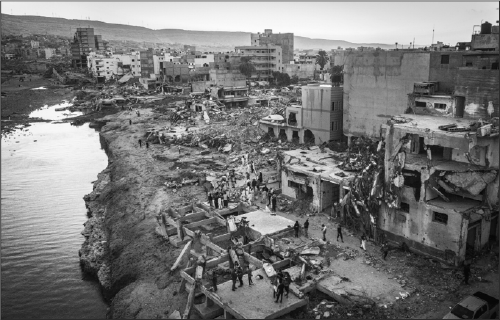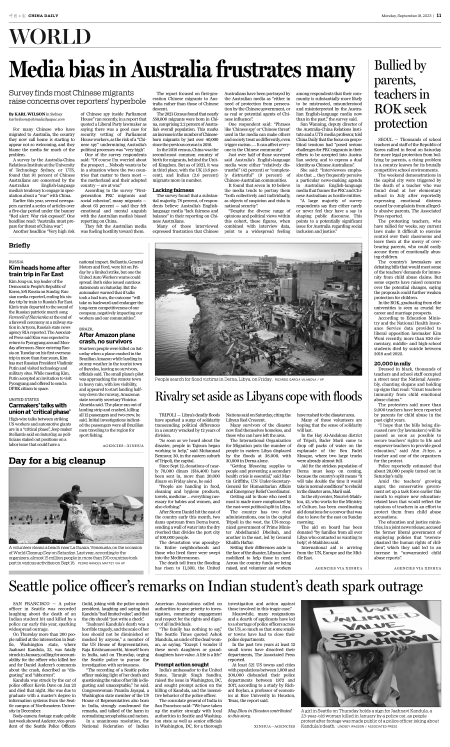
People search for flood victims in Derna, Libya, on Friday.
TRIPOLI — Libya's deadly floods have sparked a surge of solidarity transcending political differences in a country wracked by 12 years of division.
"As soon as we heard about the disaster, people in Tajoura began working to help," said Mohannad Bennour, 30, in the eastern suburb of Tripoli, the capital.
Since Sept 12, donations of nearly 70,000 dinars ($14,400) have been sent in, more than 20,000 dinars on Friday alone, he said
"People are handing in food, cleaning and hygiene products, towels, medicine … everything necessary for babies and women, and also clothing."
After Storm Daniel hit the east of the country early this month, two dams upstream from Derna burst, sending a wall of water into the dry riverbed that divides the port city of 100,000 people.
The devastation was apocalyptic. Entire neighborhoods and those who lived there were swept into the Mediterranean.
The death toll from the flooding has risen to 11,300, the United Nations said on Saturday, citing the Libyan Red Crescent.
Many survivors of the disaster now find themselves homeless, and those who can have left the area.
The International Organization for Migration puts the number of people in eastern Libya displaced by the floods at 38,000, with 30,000 in Derna alone.
"Getting lifesaving supplies to people and preventing a secondary health crisis is essential," said Martin Griffiths, UN Under-Secretary-General for Humanitarian Affairs and Emergency Relief Coordinator.
Getting aid to those who need it most is made more complicated by the east-west political split in Libya.
The country has two rival administrations, one in the capital Tripoli in the west, the UN-recognized government of Prime Minister Abdelhamid Dbeibah, and another in the east, led by General Khalifa Haftar.
Setting their differences aside in the face of the disaster, Libyans have mobilized to help those in need. Across the country funds are being raised, and volunteer aid workers have rushed to the disaster area.
Many of those volunteers are hoping that the sense of solidarity will last.
In the Hay Al-Andalous district of Tripoli, Bader Marii came to drop off packs of water on the esplanade of the Ben Fadel Mosque, where two large trucks were already almost full.
Aid for the stricken population of Derna must keep on coming, because the country's split means "it will take double the time it would take in normal conditions" to rebuild in the disaster area, Marii said.
In the city center, Nouri el-Makhlou, 43, who works for the Ministry of Culture, has been coordinating aid donations for a convoy that was due to leave for the east on Sunday morning.
The aid on board has been donated "by families from all over Libya who contacted us wanting to help", el-Makhlou said.
International aid is arriving from the UN, Europe and the Middle East.

